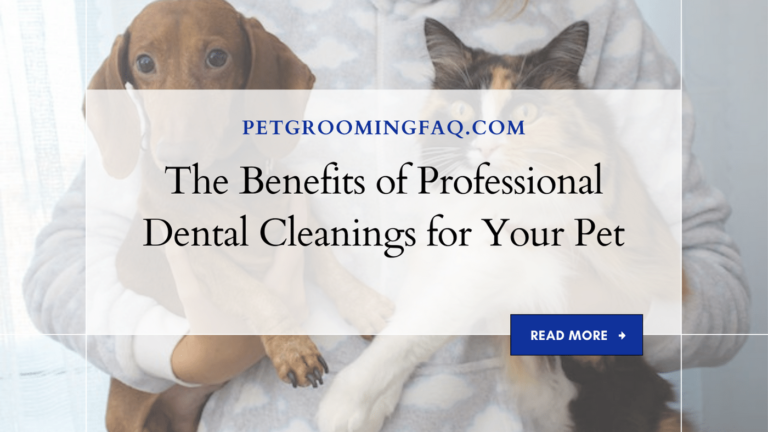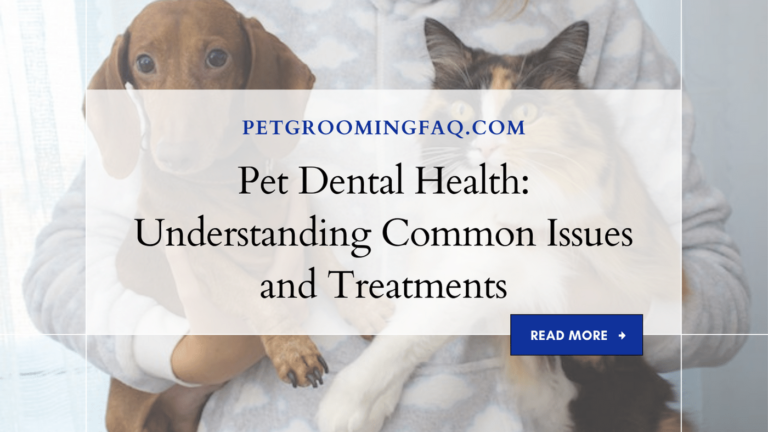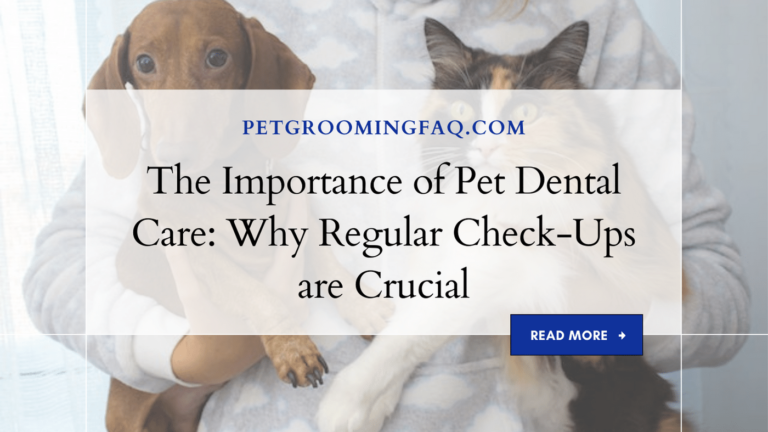The Importance of Diet in Promoting Good Dental Health in Pets
As pet owners, we all want our furry friends to be happy and healthy. While regular exercise and check-ups with the vet are undoubtedly important for overall wellbeing, maintaining good dental health is equally crucial. Did you know that your pet’s diet plays a significant role in promoting healthy teeth and gums?
In this blog post, we’ll dive into the importance of diet in keeping your pets’ pearly whites shining bright. From choosing the right food to incorporating dental treats and supplements, read on to discover how simple dietary changes can make a big difference in your pet’s oral hygiene!
Table of Contents
What is Diet?

There is no one-size-fits-all approach to good dental health for pets, as each animal’s diet will be slightly different and require a specific approach. However, there are a few things that are universally important if you want your pet to maintain healthy teeth and gums.
First and foremost, provide your pet with a balanced diet that includes plenty of fresh foods and water. Second, make sure their teeth are cleaned regularly – at least once per week – using an appropriate toothbrush and detergent.
Third, avoid giving your pet sugary snacks or treats that can increase the risk of tooth decay. In fact, many experts now recommend against feeding any type of sugary treat to pets at all; instead, offer safe alternatives like fresh fruit or vegetables. Ensure your pet gets regular dental checkups to ensure they’re staying healthy overall.
The Relationship between Diet and Oral Health
Diet is a critical part of oral health for both people and pets. Pets that have good oral health often have healthy diets. Poor diets can cause tooth decay, plaque, gingivitis and other dental problems.
Tooth Decay
Tooth decay is the most common type of dental problem in pets. Tooth decay happens when bacteria invade teeth and dissolve their supportive bone. This process makes the tooth susceptible to breaking and ultimately causes it to rot away.
There are several microorganisms that can cause tooth decay in pets, but two of the most common are Streptococcus mutans (the bacteria that causes gum disease) and Porphyromonas gingivalis (the bacteria that causes periodontitis).
Bacteria love sugar, so if your pet’s diet consists mostly of sugary treats or moist food items like raw meat, they’re almost guaranteed to get a dental infection at some point! It’s important to keep your pet’s teeth clean by brushing them regularly and flossing them if they have removable dentures or implants. If left untreated, tooth decay can lead to root loss, tooth extraction, oral cancer or even death!
Plaque & Gingivitis
Plaque is a sticky film that accumulates on teeth and other hard surfaces inside the mouth. Over time, plaque can form into tartar – a hard substance that can cause breakdowns in enamel (the harder outer layer of teeth). Tartar can also cause pain when your pet bites down on something, and can lead to gum disease.
Gingivitis is an inflammation of the gums. It can be caused by a number of things, but most commonly it’s caused by plaque and tartar. Gingivitis is usually mild, but if left untreated it can lead to tooth loss and even surgery. In extreme cases, gingivitis can even spread to the lymph nodes in the neck and cause serious infections.
To keep your pet’s teeth and mouth healthy, make sure their diet is full of fresh, healthy foods that don’t contain sugar or plaque-forming ingredients. Give them frequent chew toys and treats to help keep their teeth busy – and don’t forget to brush their teeth daily!
Types of Diet
There are a few different types of diets that can be used with pets to promote good dental health. One of the most common is the raw food diet, which consists of meat, bones, and fresh fruits and vegetables. Another type is the prebiotic diet, which provides probiotics to help promote good oral hygiene. There’s the wet food diet, which is made up of water and wet food pellets.
What to Feed Your Pet on a Diet

There are a variety of foods that can be fed to your pet on a diet, but there are some key things to keep in mind when choosing what to feed them. While most animals will thrive on a diet that consists mostly of fresh, whole food items, there are some specialized diets available for pets that require specific types of food.
A good diet for your pet will provide them with the nutrients they need to maintain dental health and prevent dental problems in the future. It is important that their diet includes enough calcium and phosphorous, as these minerals help form teeth and bones. Other key nutrients your pet should have in their diet include vitamin A, vitamin B12, niacin and biotin. Some good sources of these nutrients include liver, fish, eggs and meat.
If you’re unsure which type of diet is best for your pet or if they’ve developed a specific dietary requirement due to conditions like arthritis or diabetes, speak with their veterinarian about a possible dietary plan. It’s also important to keep in mind that not all diets are created equal – make sure to read the packaging before giving your pet any food items!
How to Weigh Your Pet for Proper Nutrition
To properly weigh your pet for its nutrition, first familiarize yourself with the standard pet weight chart. Then use that information to figure out your pet’s current weight and calculate its ideal weight. To find your dog’s ideal weight, divide his current weight by 2.2, which is the average dog’s body mass index. For cats, divide their current weight by 1.8; this will give you their ideal bodyweight range.
It’s important to keep in mind that a small animal like a mouse may need more food than a larger animal like a German shepherd because their metabolisms are different. Additionally, pregnant or nursing pets may need more food than usual as well, so always consult with your veterinarian before making any changes to your pet’s diet.
Pay attention to what you’re feeding your pet and make adjustments as needed. Diets high in meat and processed foods can contribute to dental problems and other health issues down the line, so stick to balanced meals made mostly of fresh fruits and vegetables supplemented with small amounts of quality protein sources such as chicken or turkey if desired.
Provide plenty of water too – an unthirsty Pet can easily become sick and lose weight even when eating healthy foods.
The Importance of a Good Diet for Pets
A good diet is critical for pets to maintain good dental health. A nutritious diet will provide the necessary nutrients for your pet’s teeth and bones, helping to prevent cavities and tooth decay. Variety is also key – providing your pet with different types of foods will help keep their mouths healthy and strong.
To make sure your pet gets the most out of their food, it’s important to give them enough water too – hydration is essential for maintaining a healthy mouth and gums. And lastly, be sure to brush your pet’s teeth regularly – just as you would for yourself! Brushing helps remove plaque and bacteria from between your pet’s teeth, preventing serious dental problems down the road.
The Different Types of Diets for Pets
There are many types of diets available for pets, each with its own benefits and drawbacks. Some diets are high in protein, while others are lower in protein and more balanced. Others are made with grains or corn, which can be problematic for some animals.
Here is a overview of the different types of pet food diets:
Protein-based diets: These are typically high in protein and can be beneficial for pets who need more meat or muscle tissue in their diet. They can also help to promote good dental health by providing teeth with the nutrients they need to grow properly. Some drawbacks to these diets include the potential for Vizsla puppies to develop health problems if their diet is too high in protein, such as kidney disease and seizure disorders.
Low-energy/low-calorie diets: These diets tend to be lower in calories than other types of pet food and are often recommended for dogs who are obese or have excess weight. They may also be helpful for pets who have chronic problems such as diabetes or epilepsy that impact their energy levels. The drawback to these diets is that they can make dogs extremely hungry, leading them to overeat or eat unhealthy treats from time to time.
Grain-free/high-quality meat diets: These diets generally contain higher levels of quality proteins from animal sources like chicken, duck, venison, etc., without the added grains found in most commercial pet foods. Grains can be problematic for some animals due to their susceptibility to allerg ens and their tendency to create metabolic problems such as diabetes and heart disease in pets.
Allergies/constipation-treated pets: Some people choose to feed their pets a diet that is free of grains and other allergens in order to avoid potential food allergies or conditions such as chronic constipation. These diets are often lower in calories and provide a more balanced source of nutrients for pets. They can also be more expensive than some types of pet food, but often come with the added benefits of reduced allergies and improved digestive health.
Conclusion
Diet is an important factor in promoting good dental health in pets. When you feed your pet a balanced diet, they will remain healthy and their teeth will stay strong. By feeding your pet a healthy diet, you are providing them with the nutrients they need to keep their oral cavity healthy and their breath smelling fresh.







3 Comments